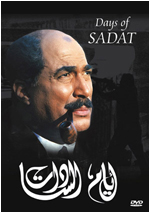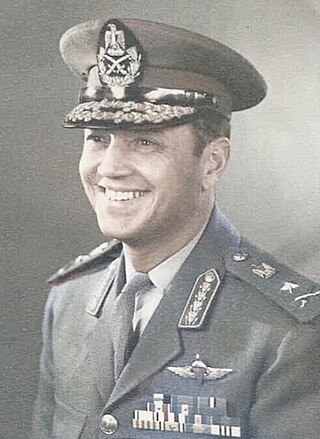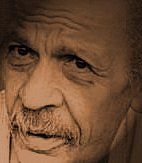
The Free Officers were a group of revolutionary Egyptian nationalist officers in the Egyptian Armed Forces and Sudanese Armed Forces that instigated the Egyptian revolution of 1952. Initially started as a small rebellion military cell under Abdel Moneim Abdel Raouf, which included Gamal Abdel Nasser, Hussein Hamouda, Khaled Mohieddin, Kamal el-Din Hussein, Salah Nasr, Abdel Hakim Amer, and Saad Tawfik, it operated as a clandestine movement of junior officers who were veterans of the Palestine War of 1948-1949 as well as earlier nationalist uprisings in Egypt in the 1940s.

Days of Sadat is a 2001 Egyptian biographical film about the third President of Egypt Anwar Al Sadat. The film features Ahmad Zaki as the Egyptian president. Cast includes Mervat Amin, Mona Zaki and Ahmed El Sakka. The film captured intimate details about the president in great accuracy. One notable characteristic of Sadat was his speech pattern, which Ahmad Zaki captured strongly in his performance.

Abdel Halim Ali Shabana, commonly known as Abdel Halim Hafez, was an Egyptian singer, actor, conductor, businessman, music teacher and film producer.

Leila Mourad or Layla Morad was an Egyptian singer and actress, and one of the most prominent superstars in Egypt and the entire Arab world in her era. Born Lilian Zaki Ibrahim Mourad to Jewish parents of Syrian and Moroccan descent in the El Daher District in Cairo, she later changed her name to Leila Mourad as a stage-name. Leila married three times and divorced three times. She died in 1995.

The Egyptian Military College is the oldest and most prominent military academy in Egypt. One of the colleges of the Egyptian Military Academy Traditionally, graduates of the Military Academy are commissioned as officers in the Egyptian Army. However, they may serve in other branches and commands of the Egyptian military establishment.

Saad el-Din Mohamed el-Husseiny el-Shazly was an Egyptian military officer. He was Egypt's chief of staff during the Yom Kippur War. He is credited with the equipping and preparation of the Egyptian Armed Forces in the years prior to the successful capture of the Israeli Bar-Lev line at the start of the Yom Kippur War. He was dismissed from his post on 13 December 1973.

Mona Ali Mohamed Zaki is an Egyptian actress.

Hassan Mohammed Allam was one of the pioneers of modern construction in Egypt.

Muhammad Salah Eldin Bahgat Ahmad Helmy, known as "Salah Jaheen" or "Salah Jahin" was a leading Egyptian poet, lyricist, playwright and cartoonist.

Sanaa Gamil, born Soraya Youssef Atallah, was an Egyptian actress. She is one of the most prominent artistic figures in the golden age of Egyptian film industry.

Ahmad Fo'ad Negm, popularly known as Elfagumi الفاجومي, was an Egyptian vernacular poet. Negm is well known for his work with Egyptian composer Sheikh Imam, as well as his patriotic and revolutionary Egyptian Arabic poetry. Negm has been regarded as "a bit of a folk hero in Egypt."
Nasser 56 is a 1996 Egyptian historical film directed by Mohammed Fadel and starring Ahmed Zaki. The film focuses on the nationalization of the Suez Canal by Egypt's second President, Gamal Abdel Nasser, and the subsequent Suez War with Israel, the United Kingdom, and France.
Mohammed Fadel is a veteran Egyptian television and film director. Fadel, along with Osama Anwar Okasha and Inaam Mohamed Ali, is credited in Egypt for establishing the genre of Egyptian dramatic serial television. He is considered a "godfather" of Egyptian television serials.

Soheir Zaki is an Egyptian belly dancer and actress. She appeared in over 100 Egyptian films from the 1960s to the 1980s.

Yakan Hussein Zaki Yakan was an Egyptian football coach and former football player who played as a defensive midfielder. He spent almost his whole career with Zamalek. He played also for the Egypt national football team. He was part of the team that won the 1959 African Cup of Nations.
Kaboria is a 1990 Egyptian boxing film written by Issam Al-Shamaa and directed by Khairy Beshara The film stars Ahmed Zaki, Raghda and Hussein El-Imam.
Ana wa Banati is a 1961 Egyptian film starring Salah Zulfikar and Nahed Sherif. The film is written and directed by Hussein Helmy El-Mohandess. The film features an ensemble cast that includes Zaki Rostom, Amaal Farid, Fayza Ahmed and Zahret El-Ola.

Sayed Marei was an Egyptian politician who held various posts during the presidency of Gamal Abdel Nasser and Anwar Sadat. He is one of the officials who shaped the agrarian activities in Egypt during the 1950s and 1960s.
The Treasure: Truth and Imagination is a 2017 Egyptian film that spans across three distinct eras: the Pharaonic era, the Mamluk era, and the first half of the 20th century. The film is directed by Sherif Arafa, written by Abdel Rahim Kamal, and produced by Walid Sabry, and stars Mohamed Saad, Mohamed Ramadan, Hend Sabry, Ahmed Rizk, Ahmed Hatem, Amina Khalil, and Ruby.












